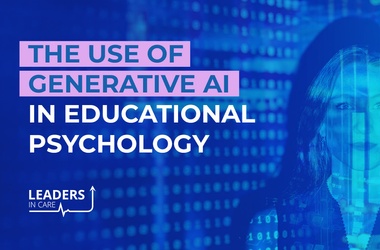As caseloads rise and resources stretch thin, educational psychologists are increasingly seeking tools that can improve efficiency, elevate insight, and preserve meaningful client interaction. Artificial Intelligence (AI) has emerged as one of the most talked-about solutions, but its relevance goes far beyond hype.
In 2025, AI is no longer an abstract future technology; it’s a practical resource already shaping the way psychologists work. From intelligent transcription to data-driven behavioural tools, AI offers clear potential to support practice when applied thoughtfully, ethically, and professionally.
In this blog, we’ll explore both the literal and conceptual tools at your disposal. We’ll cover AI-powered platforms that are currently available and worth exploring, as well as the wider strategies for integrating AI into your work, with your values and clients at the centre.
Why AI - and Why Now?
Educational psychologists are expected to deliver timely, evidence-based support across a wide range of complex needs, from learning difficulties and emotional regulation to SEND (Special Educational Needs and Disabilities) assessments and family interventions.
Yet many report rising admin burdens, limited access to real-time data, and growing cognitive overload.
AI offers ways to address this challenge by helping professionals:
-
Reduce time spent on transcription and documentation
-
Draw insights from multi-source data
-
Detect behavioural trends earlier
-
Support prioritisation and planning
-
Enable more personalised and timely interventions
Crucially, AI doesn’t replace the human elements of psychology, it augments them. Used ethically, AI is a co-pilot: freeing up professionals to spend more time where it matters - with children, families, and schools.
Key Areas of Integration: AI Tools Supporting Educational Psychology
To make sense of the broad AI landscape, we’ve grouped emerging tools into four categories that may be most relevant for UK-based educational psychologists.
Please note: Many of the tools listed below were developed in the US and are not specifically tailored to the UK system. Educational Psychologists in the UK may need to adapt language, frameworks, or clinical assumptions to ensure they align with local policy, legal, and practice standards.
1. Assessment & Reporting Automation
AI can significantly reduce the time spent on report drafting, information synthesis, and case analysis. These tools support psychologists in managing documentation while maintaining high standards of clinical integrity.
School Psych AI
Purpose-built for school and educational psychologists, this platform supports the creation of strength-based, defensible reports. It uses pre-set frameworks aligned with best practice, streamlining workflow without compromising accuracy.
PsychAssist.ai
Designed to handle the entire assessment pipeline, PsychAssist automates elements of intake, case planning, and report generation. With customisable templates and workflows, it reduces manual repetition and enables professionals to focus on decision-making and relationship-building.
Mentalyc, Upheal & Heidi Health
These AI-powered documentation platforms are widely used in mental health settings to generate therapy notes, summaries, and treatment plans. While not psychology-specific, their NLP-driven outputs can assist in drafting case material, particularly where compliance and note-taking are time-intensive.
Please note: These tools should always be used with caution and never as a replacement for psychological judgment. Secure systems and clear consent processes are essential.
2. Early Detection & Behavioural Insights
AI can help flag emerging risks and patterns by analysing behaviour, attendance, and digital activity data, particularly useful in school or service-wide settings.
Impero Wellbeing
Developed with leading child safety charities, Impero Wellbeing uses keyword detection across digital platforms to flag safeguarding concerns. It merges online and offline indicators to provide an integrated view of student wellbeing, supporting early, joined-up intervention.
Securly Aware & Gaggle
Both platforms monitor students' online behaviour using AI to detect signs of distress, risk, or harmful communication. With real-time alerts and human review layers, these tools are widely adopted in educational settings to enhance safeguarding frameworks.
Tes Class Charts
While primarily a classroom management tool, Tes Class Charts enables structured behaviour tracking and pattern recognition across lessons. This data can be valuable when building contextual understanding for assessment or consultation.
3. Cognitive and Neurodevelopmental Screening
Several platforms now offer AI-enhanced tools to assess specific cognitive domains, supporting early identification of learning challenges.
Creyos
Creyos delivers validated assessments that measure working memory, attention, executive function and reasoning. Its AI analytics engine benchmarks individual results against normative datasets, helping to inform educational and cognitive profiles.
Linus Health
Designed to detect subtle cognitive changes, Linus Health offers digital cognitive testing suitable for a range of age groups. Its AI-enabled approach supports early intervention by identifying atypical performance patterns with greater sensitivity.
4. Transcription and Information Management
AI-driven speech recognition has transformed the way professionals capture and process case data. These tools offer quick, reliable transcription - a major time-saver in busy roles.
Otter.ai & Fireflies.ai
Both tools use natural language processing to transcribe and summarise meetings, interviews, and voice notes. Educational psychologists can use them to document sessions, record professional reflections, or collaborate across multi-agency teams, reducing the burden of manual write-ups.
Ethical, Practical, and Professional Considerations
Bringing AI into psychological practice requires more than choosing the right software. It requires a strong ethical framework - one that prioritises client safety, professional standards, and informed decision-making.
Key principles include:
1. Transparency & Consent
Families and clients must be informed about any AI-driven tools used in their care or assessments. Ensure that processes are explained clearly and that consent is gained and documented.
2. Data Protection & Security
GDPR compliance is non-negotiable. Only use platforms with secure data storage, end-to-end encryption, and robust privacy policies.
3. Human Oversight
Every insight generated by AI should be interpreted, not accepted blindly. The psychologist’s judgment remains central to ethical practice.
4. Bias Awareness
AI tools can inherit biases from their training data. Ongoing monitoring is required to ensure fair and equitable outcomes, particularly in culturally diverse or neurodiverse populations.
Want to Learn More? Join Our Upcoming CPD Event
At Leaders in Care, we believe in supporting the continued professional development of the sector, beyond recruitment.
That’s why we’re hosting a free CPD-accredited webinar designed specifically for educational psychologists, “Application of AI in Psychological Practice: Opportunities, Ethics, and Impact”, led by Dr Rachael Skews.
🗓 Date: June 24th, 2025
🕔 Time: 5:00 PM
📍 Location: Online
🎓 Includes: CPD certificate, recording, resources, and slides
To help you get even more from the session, we’re also publishing a dedicated series of blogs exploring the evolving role of AI in psychological services:
🔗 Harnessing AI in Educational Psychology: Balancing Innovation with Human Insight
Final Thoughts
Educational psychology is evolving, and AI can play a valuable role in that transformation. By automating routine tasks, surfacing insights, and strengthening proactive support, AI helps psychologists spend more time on what truly matters: helping children thrive.
But success isn’t just about the tools. It’s about how we use them.
At Leaders in Care, we’re proud to work with services and professionals who value thoughtful innovation. Through CPD, expert events, and strategic partnerships, we help ensure that new technologies serve human-centred practice.







